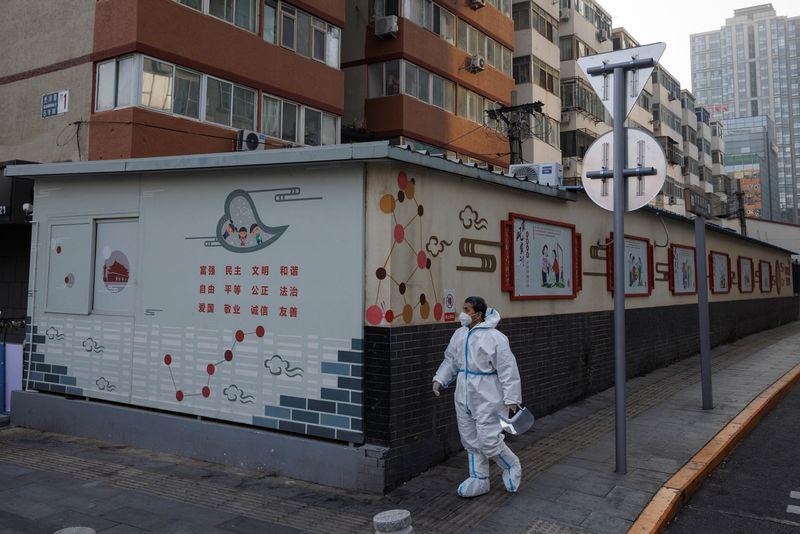(Corrects time since Guangzhou protest in 11th paragraph)
By Bernard Orr
BEIJING (Reuters) - Chinese cities imposed more curbs on Wednesday to rein in rising coronavirus cases, adding to investor worries about the economy as fresh unrest at the world's largest iPhone plant highlighted the social and industrial toll of China's strict COVID-19 measures.
In Beijing, malls and parks were shut and once-bustling areas of the capital resembled ghost towns as authorities urged people to stay home. Shanghai barred recent arrivals from restaurants and other venues, and numerous cities have imposed localised lockdowns as infections neared highs seen in April.
The measures are darkening the outlook for the world's second-largest economy and dampening hopes that China would significantly ease its outlier COVID policy any time soon.
"While there is little prospect of the authorities opting to step back from the zero-COVID policy during the winter, there is a significant risk that containment efforts fail," analysts at Capital Economics wrote. Such a failure could result in more lockdowns which would cause unprecedented damage to the economy, the analysts added.
China's COVID curbs, the tightest in the world, have fuelled widespread discontent and disrupted production at manufacturers including Taiwan's Foxconn, Apple Inc (NASDAQ:AAPL)'s biggest iPhone supplier.
On Wednesday, scenes uploaded on social media showed Foxconn workers pulling down barriers and fighting with authorities in hazmat suits, chanting "give us our pay". The unrest follows weeks of turmoil which has seen scores of employees leave the factory over COVID controls.
Localities accounting for nearly one-fifth of China's total GDP under some form of lockdown or curbs, brokerage Nomura estimated earlier this week, a figure that would exceed the GDP of the British economy.
TESTING RESOLVE
Even though infection numbers are low by global standards, China has stuck with its zero-COVID approach, a signature policy of President Xi Jinping that officials argue saves lives and prevents the medical system from being overwhelmed. As of Tuesday, there were 28,883 new domestically transmitted cases, official data showed.
The International Monetary Fund urged China to further recalibrate its COVID-19 strategy and boost vaccination rates.
"Although the zero-COVID strategy has become nimbler over time, the combination of more contagious COVID variants and persistent gaps in vaccinations have led to the need for more frequent lockdowns, weighing on consumption and private investment," IMF official Gita Gopinath said.
Residents are increasingly fed up with nearly three years of restrictions, and Wednesday's protest at the Foxconn factory in Zhengzhou comes less than two weeks after crowds crashed through barriers and clashed with hazmat-suit-clad workers in the southern city of Guangzhou.
The rising case numbers are also testing China's resolve to avoid one-size-fits-all measures such as mass lockdowns to curb outbreaks, and rely on recently tweaked COVID rules instead.
However, unofficial lockdowns have increased, including in residential buildings and compounds in Beijing, where case numbers hit a new high on Tuesday.
In Shanghai, a city of 25 million that was locked down for two months earlier this year, China's top auto association said on Wednesday it would cancel the second day of the China Automotive Overseas Development Summit being held there over COVID concerns.
Chengdu, with 428 cases on Tuesday, became the latest city to announce mass testing.
Major manufacturing hubs Chongqing and Guangzhou have seen persistently high infection numbers, accounting for most of China's caseload. Cases in Guangzhou fell slightly on Tuesday to 7,970 and authorities have said infections continue to be concentrated in key areas of Haizhu district.

Investors who last week were hopeful that China would ease restrictions soon have grown worried that the latest infection wave could slow the economic reopening. Many analysts say a significant reopening is unlikely before March or April.
"The next few weeks could be the worst in China since the early weeks of the pandemic both for the economy and the healthcare system," said analysts at Capital Economics.